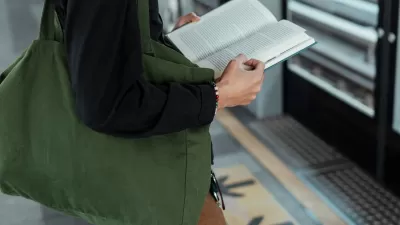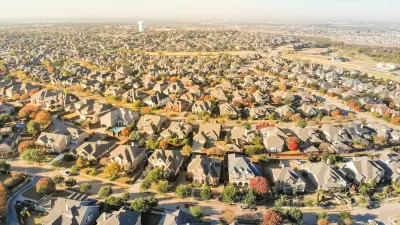In this excerpt from her new book, "Before the Lights Go Out" author Maggie Koerth-Baker warns of the converging crises of peak oil and climate change on suburban areas.
Using Merriam, Kansas as an example of the typical American suburban environment, Koerth-Baker considers the impacts of what the current science predicts will be a hotter, wetter world with less and more expensive oil:
"Metro towns aren't self-reliant. Their fates have been tied to the fates of the towns they touch for decades. That interconnection works now because gasoline is cheap. What happens to a metro town when travel from one part to another is no longer easy and frequent, no longer something that can happen daily or hourly? What happens when the parts of a metro can no longer rely on the direct support of all of the others but are still on the hook for funding shared systems? What happens to the city at the metro's heart when it can no longer count on the social support, the financial investments, and the intellectual capital of people who actually live elsewhere?"
We have two problems: our metro lifestyles require energy, but we also want to avoid the negative impacts climate change and peak oil will have on metro communities."
FULL STORY: Spread Reckoning

Alabama: Trump Terminates Settlements for Black Communities Harmed By Raw Sewage
Trump deemed the landmark civil rights agreement “illegal DEI and environmental justice policy.”

Planetizen Federal Action Tracker
A weekly monitor of how Trump’s orders and actions are impacting planners and planning in America.

The 120 Year Old Tiny Home Villages That Sheltered San Francisco’s Earthquake Refugees
More than a century ago, San Francisco mobilized to house thousands of residents displaced by the 1906 earthquake. Could their strategy offer a model for the present?

In Both Crashes and Crime, Public Transportation is Far Safer than Driving
Contrary to popular assumptions, public transportation has far lower crash and crime rates than automobile travel. For safer communities, improve and encourage transit travel.

Report: Zoning Reforms Should Complement Nashville’s Ambitious Transit Plan
Without reform, restrictive zoning codes will limit the impact of the city’s planned transit expansion and could exclude some of the residents who depend on transit the most.

Judge Orders Release of Frozen IRA, IIJA Funding
The decision is a victory for environmental groups who charged that freezing funds for critical infrastructure and disaster response programs caused “real and irreparable harm” to communities.
Urban Design for Planners 1: Software Tools
This six-course series explores essential urban design concepts using open source software and equips planners with the tools they need to participate fully in the urban design process.
Planning for Universal Design
Learn the tools for implementing Universal Design in planning regulations.
Clanton & Associates, Inc.
Jessamine County Fiscal Court
Institute for Housing and Urban Development Studies (IHS)
City of Grandview
Harvard GSD Executive Education
Toledo-Lucas County Plan Commissions
Salt Lake City
NYU Wagner Graduate School of Public Service





























